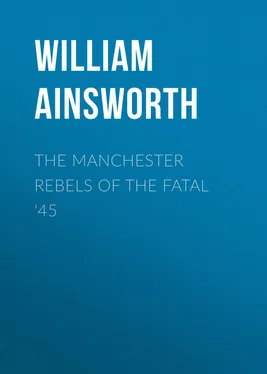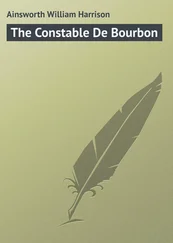William Ainsworth - The Manchester Rebels of the Fatal '45
Здесь есть возможность читать онлайн «William Ainsworth - The Manchester Rebels of the Fatal '45» — ознакомительный отрывок электронной книги совершенно бесплатно, а после прочтения отрывка купить полную версию. В некоторых случаях можно слушать аудио, скачать через торрент в формате fb2 и присутствует краткое содержание. Издательство: Иностранный паблик, Жанр: foreign_prose, на английском языке. Описание произведения, (предисловие) а так же отзывы посетителей доступны на портале библиотеки ЛибКат.
- Название:The Manchester Rebels of the Fatal '45
- Автор:
- Издательство:Иностранный паблик
- Жанр:
- Год:неизвестен
- ISBN:нет данных
- Рейтинг книги:5 / 5. Голосов: 1
-
Избранное:Добавить в избранное
- Отзывы:
-
Ваша оценка:
- 100
- 1
- 2
- 3
- 4
- 5
The Manchester Rebels of the Fatal '45: краткое содержание, описание и аннотация
Предлагаем к чтению аннотацию, описание, краткое содержание или предисловие (зависит от того, что написал сам автор книги «The Manchester Rebels of the Fatal '45»). Если вы не нашли необходимую информацию о книге — напишите в комментариях, мы постараемся отыскать её.
The Manchester Rebels of the Fatal '45 — читать онлайн ознакомительный отрывок
Ниже представлен текст книги, разбитый по страницам. Система сохранения места последней прочитанной страницы, позволяет с удобством читать онлайн бесплатно книгу «The Manchester Rebels of the Fatal '45», без необходимости каждый раз заново искать на чём Вы остановились. Поставьте закладку, и сможете в любой момент перейти на страницу, на которой закончили чтение.
Интервал:
Закладка:
William Harrison Ainsworth
The Manchester Rebels of the Fatal '45
With faltering voice, she weeping said,
"O, Dawson, monarch of my heart!
Think not thy death shall end our loves,
For thou and I will never part!"
PREFACE
All my early life being spent in Manchester, where I was born, bred, and schooled, I am naturally familiar with the scenes I have attempted to depict in this Tale.
Little of the old town, however, is now left. The lover of antiquity – if any such should visit Manchester – will search in vain for those picturesque black and white timber habitations, with pointed gables and latticed windows, that were common enough sixty years ago. Entire streets, embellished by such houses, have been swept away in the course of modern improvement. But I recollect them well. No great effort of imagination was therefore needed to reconstruct the old town as it existed in the middle of the last century; but I was saved from the possibility of error by an excellent plan, almost of the precise date, designed by John A. Berry, to which I made constant reference during my task. Views are given in this plan of the principal houses then recently erected, and as all these houses were occupied by Prince Charles and the Highland Chiefs during their stay in Manchester, I could conduct the Rebel leaders to their quarters without difficulty. One of the houses, situated in Deansgate, belonged to my mother's uncle, Mr. Touchet. This is gone, as is Mr. Dickenson's fine house in Market Street Lane, where the Prince was lodged. Indeed, there is scarcely a house left in the town that has the slightest historical association belonging to it.
When I was a boy, some elderly personages with whom I was acquainted were kind enough to describe to me events connected with Prince Charles's visit to Manchester, and the stories I then heard made a lasting impression upon me. The Jacobite feeling must have been still strong among my old friends, since they expressed much sympathy with the principal personages mentioned in this Tale – for the gallant Colonel Townley, Doctor Deacon and his unfortunate sons, Jemmy Dawson, whose hapless fate has been so tenderly sung by Shenstone, and, above all, for poor Tom Syddall. The latter, I know not why, unless it be that his head was affixed on the old Exchange, has always been a sort of hero in Manchester.
The historical materials of the story are derived from the Chevalier de Johnstone's Memoirs of the Rebellion , and Dr. Hibbert Ware's excellent account of Prince Charles's sojourn in the town, appended to the History of the Manchester Foundations . But to neither of these authorities do I owe half so much as to Beppy Byrom's delightful Journal, so fortunately discovered among her father's papers at Kersal Cell, and given by Dr. Parkinson in the Remains of John Byrom , published some twenty years ago, by the Chetham Society. Apart from the vivid picture it affords of the state of Manchester at the period, of the consternation into which the inhabitants were thrown by the presence of the Rebel Army, and the striking description given in it of the young Chevalier and his staff, the Journal is exceedingly interesting, and it is impossible to read it without feeling as if one were listening to the pleasant chat of the fair writer. Pretty Beppy is before us, as sprightly and as loveable as she was in life. In no diary that I have read is the character of the writer more completely revealed than in this.
Of Beppy, the bewitching, and her admirable father, I have endeavoured to give some faint idea in these pages.
While speaking of the Chetham Society, which has brought out so many important publications, edited with singular ability by the learned President Mr. James Crossley, Dr. Hibbert Ware, Mr. William Beamont, Canon Raines, and others, I desire to express the great satisfaction I feel at learning that a very large collection of the letters of Humphrey Chetham, and some of his friends and contemporaries, have been placed, for publication, in the hands – and in no better hands could they have been placed – of Canon Raines.
Unquestionably, this will be the crowning work of the Chetham Society, and at last, from the able editor of The Journal of Nicholas Assbeton, of Downham , we shall no doubt receive an adequate biography of the great Lancashire worthy.
To return to my tale. I must not omit to mention that the tragic incident I have connected with Rawcliffe Hall really occurred – though at a much more remote date than is here assigned to it – at Bewsey House, an old moated mansion, near Warrington, still, I believe, in existence.
At one circumstance I must needs rejoice. Since the publication of this Tale, and incited, I am told, by its perusal, Mr. Samuel Brierley, of Rochdale, has put together a very interesting collection of anecdotes relating to the visit of Lochiel, with a small portion of the Highland Army, to Rochdale, in 1745. 1 1 "Rochdale in 1745 and 1746." By an Old Inhabitant. Rochdale, John Turner, Drake Street, 1874.
These stories, I understand, were narrated to Mr. Brierley by his great grandmother, who died in 1806, aged ninety-three. That they were well worth preserving will be apparent from some extracts which I propose to make from the little work.
Here is a well-told incident which might be entitled "Lochiel and the Lancashire Lad."
"On the 25th November, 1745, the rebel army, supposed to be 5,000 or 6,000 strong, and composed of cavalry, infantry, and artillery, arrived at Lancaster, under the personal command of Prince Charles, who gave instructions that the greater portion of this force should, on its arrival at Preston, proceed to Manchester by way of Wigan, and the smaller part through Blackburn and Rochdale, and thus concentrate the main body at Manchester. The latter portion was seen marching over Ashworth Moor, under the command of Lochiel of Glengarry, where they halted to have refreshment, which consisted of oatmeal steeped in water. Most of the country people fled on their approach, but there was one who stood looking on, and that was James Lomax, of Woolstenholme; he was asked to join the army but feigned not to understand the question, but said he would jump agen the measter (pointing to Glengarry) o'er that big stone fence, for a gallon of ale. The bet was accepted, and Lomax had the first jump. Being a lithe and supple fellow, he cleared it at a bound, ran down the back of the fence wall, and was no more seen. The officers and men laughed at this incident; and Lochiel, on turning round, perceived a streak of smoke rising from the top of Knowle Hill. This and Lomax disappearing so suddenly, caused great perplexity to those in command; and suspecting that there might be a surprise before they got to the town, the troops were ordered to fall in and make ready, and the advanced scouts to keep a watchful eye both right and left of the road."
Another very amusing story relates to a Highlander who was billeted at the Union Hotel.
"One of the privates, a kilted man, went into the kitchen and spoke to Betty the cook, told her she was a bonnie lassie, and said, 'Wull ye let me put a piece of bread in the drippin?' pointing to the beef on the spit; she replied, 'Naw, haw winnut,' but at the same time he threw a piece of black bannock into the dripping pan, and cook said in a loud voice, 'Hom noan gooin to hav ony o thaw impidunce,' at the same time throwing out the bread with her basting spoon, into the ashes. This so exasperated the Scot that he placed his hand on his sword, but Betty, as quick as thought, got the basting spoon full of hot dripping, and threw it at him, covering his face, hands, and bare knees with it, thereby causing him to scream with the burning pain; at the same moment Mally Garlick, who had been paring potatoes, said, 'Do go away, for this dog is breakin out of his cage,' – she had privately opened the door, and the dog rushed at the Scot, and chased him out of the house, tore a large piece out of the back part of his kilt, which he had to get repaired before he could decently attend another parade. But the scalds or burns inflicted upon him proved more serious than was anticipated, and he was placed under the medical skill of Doctor Moult. The doctor recommended a short rest from his laborious duties; this rest, with the unremitting attentions bestowed upon him by the relenting cook, led to mutual affection, and when he recovered he never rejoined the invading force, but married her who had caused his injuries, settled in the town, became a thriving tradesman, and has descendants here who are highly respectable and wealthy."
Читать дальшеИнтервал:
Закладка:
Похожие книги на «The Manchester Rebels of the Fatal '45»
Представляем Вашему вниманию похожие книги на «The Manchester Rebels of the Fatal '45» списком для выбора. Мы отобрали схожую по названию и смыслу литературу в надежде предоставить читателям больше вариантов отыскать новые, интересные, ещё непрочитанные произведения.
Обсуждение, отзывы о книге «The Manchester Rebels of the Fatal '45» и просто собственные мнения читателей. Оставьте ваши комментарии, напишите, что Вы думаете о произведении, его смысле или главных героях. Укажите что конкретно понравилось, а что нет, и почему Вы так считаете.












